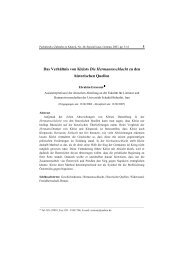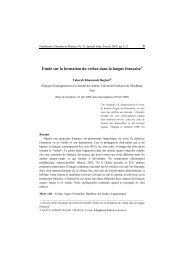Phonological Metathesis in Persian: Synchronic, Diachronic, and the ...
Phonological Metathesis in Persian: Synchronic, Diachronic, and the ...
Phonological Metathesis in Persian: Synchronic, Diachronic, and the ...
You also want an ePaper? Increase the reach of your titles
YUMPU automatically turns print PDFs into web optimized ePapers that Google loves.
The Long-Term Effect of Selective Written ... 51<br />
opponents of corrective feedback. In fact, s<strong>in</strong>ce <strong>the</strong> publication of Truscott's review<br />
article a number of o<strong>the</strong>r studies have found corrective feedback to be <strong>in</strong>effective<br />
(e.g., Fazio, 2001; Polio, Fleck, & Leder, 1998). Never<strong>the</strong>less, Bitchener (2008),<br />
Bitchener <strong>and</strong> Knoch (2008), Ellis, Sheen, Murakami, <strong>and</strong> Takashima (2008),<br />
Rahimi (2009), <strong>and</strong> Sheen (2007) have provided some evidence that corrective<br />
feedback can be effective <strong>in</strong> improv<strong>in</strong>g <strong>the</strong> accuracy of L2 writers.<br />
A number of feedback studies have <strong>in</strong>vestigated <strong>the</strong> effect of corrective<br />
feedback on several grammatical <strong>and</strong> non-grammatical categories (e.g., Ferris,<br />
2006). However, as Norris <strong>and</strong> Ortega (2000) have po<strong>in</strong>ted out, studies that try to<br />
h<strong>and</strong>le too many variables are not likely to add much to our knowledge base. In <strong>the</strong><br />
same ve<strong>in</strong>, <strong>the</strong> effects of error correction have sometimes been measured by<br />
grammaticality judgement tests or multiple-choice grammar tests, which clearly<br />
favour students who have received formal <strong>in</strong>struction (see Ellis, 2005). As far as L2<br />
writ<strong>in</strong>g is concerned, writ<strong>in</strong>g orig<strong>in</strong>al essays is deemed to be <strong>the</strong> most au<strong>the</strong>ntic<br />
measure of writ<strong>in</strong>g abilities.<br />
Almost all feedback studies suffer from similar shortcom<strong>in</strong>gs – namely, lack of<br />
truly equivalent groups (e.g., Bitchener, Young, & Cameron, 2005), <strong>in</strong>appropriate<br />
def<strong>in</strong>ition of error categories (e.g., Ferris & Roberts, 2001), lack of a pre-test to<br />
measure <strong>in</strong>itial differences (e.g., Kepner, 1991), lack of a delayed post-test to<br />
measure long-term effects (e.g., Fathman & Whalley, 1990), <strong>and</strong> use of<br />
<strong>in</strong>appropriate test<strong>in</strong>g devices (e.g., Cardelle & Corno, 1981).<br />
Ellis et al. (2008) studied <strong>the</strong> differential effects of focused <strong>and</strong> unfocused<br />
WGF, <strong>in</strong>clud<strong>in</strong>g a control group to <strong>in</strong>vestigate Truscott's (1996) <strong>the</strong>sis regard<strong>in</strong>g <strong>the</strong><br />
<strong>in</strong>efficacy of corrective feedback. The results of <strong>the</strong> picture story tasks revealed that<br />
provid<strong>in</strong>g <strong>the</strong> learners with WGF helped <strong>the</strong>m to improve <strong>the</strong>ir use of two functions<br />
of <strong>the</strong> English article system – namely, first- <strong>and</strong> second-mention use of articles to<br />
refer to unknown <strong>and</strong> known entities. The experimental groups outperformed <strong>the</strong><br />
control group <strong>and</strong> ma<strong>in</strong>ta<strong>in</strong>ed <strong>the</strong>ir level of accuracy after 4 weeks.<br />
The present study was <strong>in</strong>spired by Ellis et al.'s (2008) research; however, <strong>the</strong>re<br />
were a number of shortcom<strong>in</strong>gs <strong>in</strong> Ellis et al.'s study which <strong>the</strong> present research has






